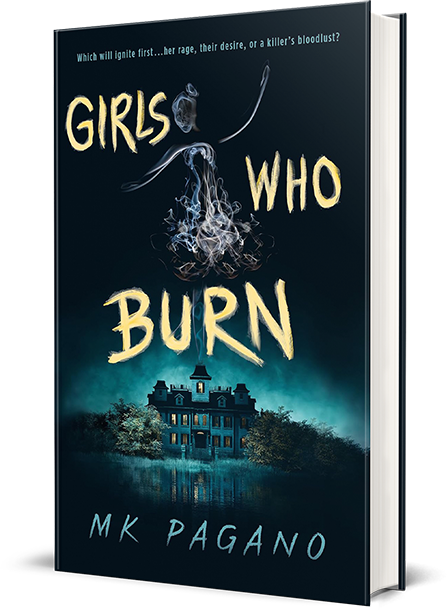MK’s Book Reviews: Big Magic

I’ve finished one of my rare forays into nonfiction with Big Magic by Elizabeth Gilbert (she of Eat, Pray, Love fame), and…
I loved this book.
“The universe buries strange jewels deep within us all, and then stands back to see if we can find them.”
Full disclosure: I expected to love this book going into it, and not only because it was recommended highly to me. With Gilbert, I find that people tend to fall firmly into either the loving-her or hating-her camp. I very much liked Eat, Pray, Love (the book; the movie was rather awful); I found her musings on depression and her mid-life crisis of sorts to be incredibly relatable when I read it in my early twenties. Is Gilbert annoying at times? For sure. But for the most part I loved her writing style and the incredible amount of vulnerability she was able to portray in that book. I remember thinking that I would never be able to be so honest and brave in my own writing (something I’m still working on) and I really admired her for it.
So if you loved Eat, Pray, Love, I predict you’ll love this book too. And if you hated Eat, Pray, Love? I highly suggest you give Big Magic a try anyway. Why?
“Do whatever brings you to life, then. Follow your own fascinations, obsessions, and compulsions. Trust them. Create whatever causes a revolution in your heart.”
For starters, this book is not a memoir. (I’m not going to paste the Goodreads summary because frankly I think it’s rather terrible and if I’d read it as a deciding factor as to whether or not I should pick up this book, I think I may have chosen not to.) Big Magic is, to put it quite simply, a book about creativity. And it’s so wonderful that I think anyone who has any ounce of creativity in them–which I believe is everyone–should immediately go and pick it up.
“A creative life is an amplified life. It’s a bigger life, a happier life, an expanded life, and a hell of a lot more interesting life. Living in this manner—continually and stubbornly bringing forth the jewels that are hidden within you—is a fine art, in and of itself.”
Gilbert is not talking only to people who are interested in pursuing careers as novelists or painters or musicians or what have you. She is talking to everyone who wants to do something that’s not “practical”–encouraging us all to live our most creative lives. This is illustrated best in an anecdote she tells about a middle-aged friend of hers who loved figure skating as a child. This woman was never an Olympic-level skater. She stopped skating for the same reasons any of us stop doing the things we loved as children–she gave it up for more practical pursuits. But one day, this woman decided that she wanted to skate again. So she went out, bought some figure skates, and now skates every morning before she has to go to work, for nothing other than the pure pleasure of doing it.
That, Gilbert argues, is creative living. We spend so much time checking off things on our to-do lists that we forget that one of the purposes to this life is to enjoy it.
“Be the weirdo who dares to enjoy.”
This book was so good, I wanted to highlight every singly passage. (Which defeats the purpose of highlighting.) So I’ve painstakingly picked out just a few of my favorite parts:
1. On why “do what you love” is a dangerous motto when you’re talking about doing it for a living:
“But to yell at your creativity, saying, “You must earn money for me!” is sort of like yelling at a cat; it has no idea what you’re talking about, and all you’re doing is scaring it away, because you’re making really loud noises and your face looks weird when you do that.”
2. Why your art doesn’t have to be life-changing:
“You’re not required to save the world with your creativity. Your art not only doesn’t have to be original; in other words, it also doesn’t have to be important. For example, whenever anyone tells me that they want to write a book in order to help other people I always think ‘Oh, please don’t. Please don’t try to help me.’ I mean it’s very kind of you to help people, but please don’t make it your sole creative motive because we will feel the weight of your heavy intention, and it will put a strain upon our souls.”
3. Why your creative pursuits don’t have to be perfect (especially relevant for women):
Too many women still seem to believe that they are not allowed to put themselves forward at all, until both they and their work are perfect and beyond criticism. Meanwhile, putting forth work that is far from perfect rarely stops men from participating in the global cultural conversation. Just sayin’. And I don’t say this as a criticism of men, by the way. I like that feature in men—their absurd overconfidence, the way they will casually decide, “Well, I’m 41 percent qualified for this task, so give me the job!” Yes, sometimes the results are ridiculous and disastrous, but sometimes, strangely enough, it works—a man who seems not ready for the task, not good enough for the task, somehow grows immediately into his potential through the wild leap of faith itself. I only wish more women would risk these same kinds of wild leaps. But I’ve watched too many women do the opposite. I’ve watched far too many brilliant and gifted female creators say, “I am 99.8 percent qualified for this task, but until I master that last smidgen of ability, I will hold myself back, just to be on the safe side.” Now, I cannot imagine where women ever got the idea that they must be perfect in order to be loved or successful. (Ha ha ha! Just kidding! I can totally imagine: We got it from every single message society has ever sent us! Thanks, all of human history!) But we women must break this habit in ourselves—and we are the only ones who can break it.
4. On the sacrifice required to do what you love (which echoes the theme of my favorite book of all time):
“What’s your favorite flavor of shit sandwich?” What Manson means is that every single pursuit—no matter how wonderful and exciting and glamorous it may initially seem—comes with its own brand of shit sandwich, its own lousy side effects. As Manson writes with profound wisdom: “Everything sucks, some of the time.” You just have to decide what sort of suckage you’re willing to deal with. So the question is not so much “What are you passionate about?” The question is “What are you passionate enough about that you can endure the most disagreeable aspects of the work?” Manson explains it this way: “If you want to be a professional artist, but you aren’t willing to see your work rejected hundreds, if not thousands, of times, then you’re done before you start. If you want to be a hotshot court lawyer, but can’t stand the eighty-hour workweeks, then I’ve got bad news for you.” Because if you love and want something enough—whatever it is—then you don’t really mind eating the shit sandwich that comes with it.”
5. And perhaps my favorite passage of all: on how to deal with people who hate what you put out there (a topic Gilbert is intimately familiar with):
“Recognizing that people’s reactions don’t belong to you is the only sane way to create. If people enjoy what you’ve created, terrific. If people ignore what you’ve created, too bad. If people misunderstand what you’ve created, don’t sweat it. And what if people absolutely hate what you’ve created? What if people attack you with savage vitriol, and insult your intelligence, and malign your motives, and drag your good name through the mud? Just smile sweetly and suggest—as politely as you possibly can—that they go make their own fucking art. Then stubbornly continue making yours.”
This book is brilliant. I really could go on and on.
Have you read Big Magic? What did you think?


I haven’t read this, perhaps I should! Wonderful review.
Thanks! Yes you should!
Wow, this sounds amazing, I really need to read this! Loved those quotes, thanks for sharing. Fantastic review 🙂
Thanks for your kind words! And come back and tell me what you think after you read it!
You’re very welcome! 🙂 And I’ll be sure to do that!
The highlights you stated itself are already legitimate and I think I should starts eye-ing this book! Thank you for such a keen and insightful review!
xx
Kyoka,
wolfcafe.wordpress.com
[…] Click here to view original web page at wanderlustywriter.com […]
[…] “Imposter syndrome” is particularly prevalent in women. From Big Magic: […]
[…] Nonfiction Big Magic. A must-read for all creatives, particularly […]
[…] I’m reminded of this quote from Big Magic: […]
[…] Elizabeth Gilbert’s Big Magic, she talks about the richness of leading “a creative life.” By that she doesn’t […]